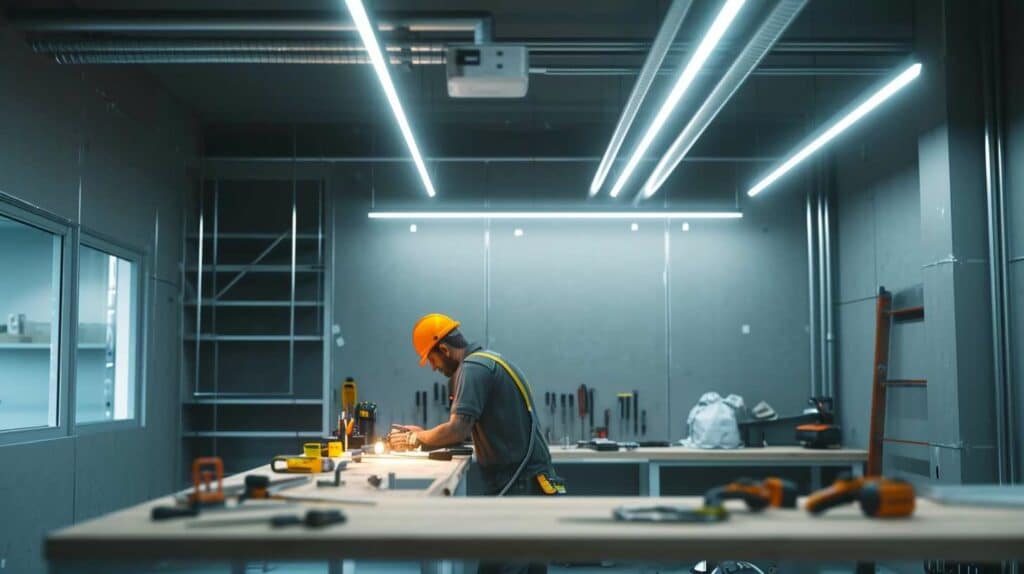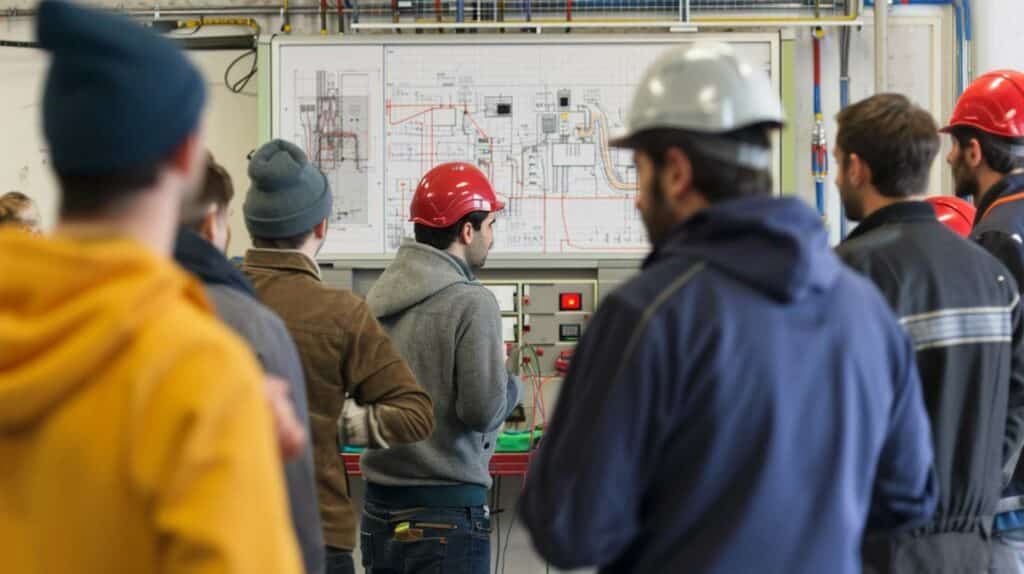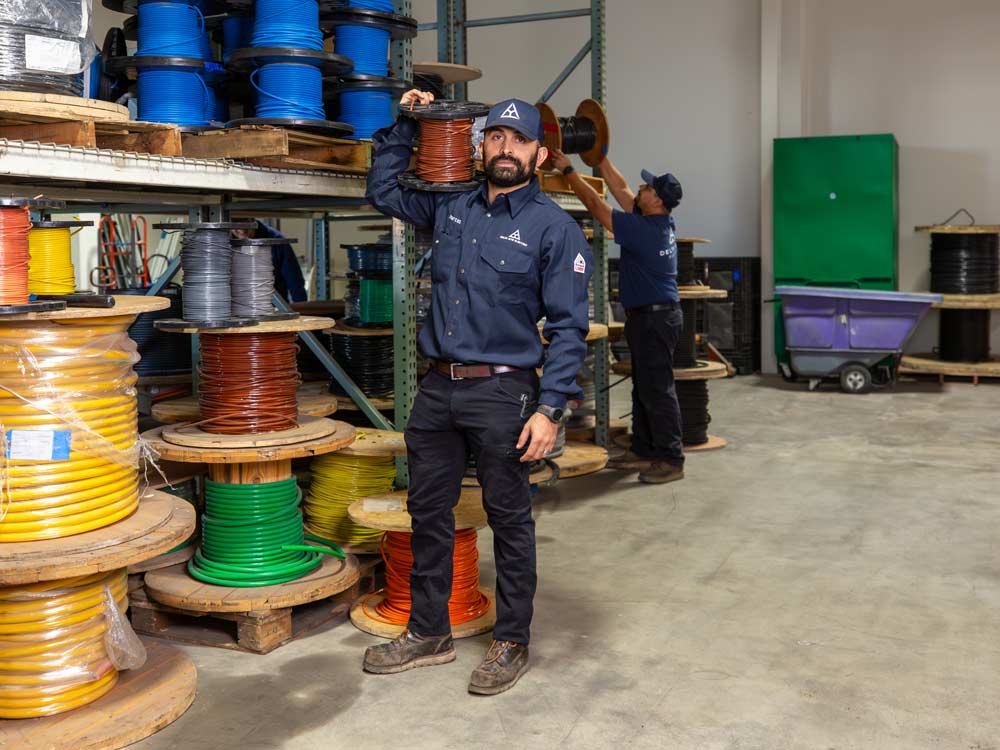In electrical contracting, the distinction between industrial and commercial electricians is pivotal, shaping the seamless operation of our modern, electrified world. While industrial electricians tackle the complexities of heavy machinery and high-voltage environments, their commercial counterparts focus on the electrical needs of businesses and retail spaces, ensuring efficient and safe power distribution.
Expertise from companies like Delta Wye Electric plays a significant role in advancing these fields.
This article delves into industrial and commercial electricians’ unique challenges and specialized skills. Understanding their distinct roles gives us insights into the intricate electrical systems crucial for robust industrial operations and efficient commercial environments.
What is Electrical Contracting?
Electrical contracting, a dynamic and indispensable field, encompasses a range of intricate tasks that revolve around the design, installation, maintenance, and repair of electrical systems. This complex practice spans diverse terrains, from meticulously handling residential wiring to fearlessly operating within hazardous industrial environments. Its influence reverberates across sectors as varied as bustling construction sites, bustling commerce centers, and humming manufacturing plants, playing a central role in powering the very heart of modern society.

This vast industry’s core lies in the dedicated cohort of electricians who ensure its critical functions. These skilled professionals navigate potential hazards with an unmatched blend of expertise and caution. In the face of high voltages, volatile materials, and intricate networks, electricians are the unsung heroes who keep the lights on, the machines running, and the cities vibrant. Their ability to execute their tasks safely and efficiently is a testament to their deep knowledge of the electrical systems they work with and their unwavering commitment to adhering to rigorous safety protocols.
Whether threading delicate wires through residential walls or orchestrating the dance of heavy-duty machinery in an industrial complex, electricians are responsible for completing their tasks successfully and doing so without compromising the safety of themselves, their colleagues, or the spaces they work in. Their ability to comprehend the intricacies of electrical systems, anticipate potential pitfalls, and swiftly respond to unforeseen challenges is what truly sets them apart as experts in their craft.
Industrial Electrical Contractors: Illuminating the Heart of Heavy Industry
In the humming heart of industrial landscapes, where giant machines roar to life and intricate systems orchestrate a production symphony, industrial electrical contractors emerge as the unsung champions of power and precision.
Operating within some of the most demanding and hazardous environments, these skilled professionals are the backbone of industrial operations, ensuring the seamless flow of electricity and the safe function of machinery.
Work Environments: Powerhouses of Production
Industrial electrical contractors thrive in work environments that define the very essence of heavy industry. From sprawling manufacturing plants to bustling factories and deep mines, their expertise is harnessed where power-hungry machines and complex systems converge.
These environments are not for the faint of heart and are often characterized by high voltages, intricate machinery, and potential hazards. The ability to navigate through these conditions with precision and mastery is a hallmark of industrial electricians.
Core Responsibilities and Specializations: The Craft of Complexity
Within these formidable settings, industrial electrical contractors tackle diverse responsibilities, often requiring specialized skills that set them apart from their counterparts in other electrical domains. They are the wizards behind the scenes, dealing with hydraulic machinery, sophisticated robotics, and intricate control systems that keep the gears of industry turning.

A deep understanding of safety regulations and codes is paramount, given the critical role these electricians play in maintaining not only the functionality of machinery but also the well-being of everyone involved.
The core responsibilities of industrial electrical contractors include the following:
- Designing, installing, and maintaining intricate electrical systems within industrial settings.
- Troubleshooting system malfunctions and performing necessary repairs.
- Ensuring compliance with safety standards and regulations.
- Identifying potential problems ahead of time to prevent hazardous situations from arising.
- Configuring specialized machinery for optimal performance.
- Maximizing the efficiency of existing systems and equipment.
Key Duties: Powering Progress
The roles of industrial electrical contractors encompass a trilogy of vital duties: installation, troubleshooting, and maintenance. Their involvement begins with installing electrical systems that underpin the entire industrial operation.
As the machinery churns and systems hum, these experts are the first responders to any electrical malfunction, skillfully diagnosing and resolving issues to minimize downtime and maximize productivity. Moreover, their role in ongoing maintenance ensures the longevity and reliability of these systems, preventing costly disruptions that could otherwise grind production to a halt.
Training and Qualification Requirements: Navigating Complexity
Becoming a proficient industrial electrical contractor requires rigorous training and a thirst for mastering complexity. Beyond the foundational electrical knowledge, these professionals often pursue specialized courses that equip them with the skills to handle the intricacies of industrial machinery and systems.
Apprenticeships, vocational training, and relevant certifications provide a robust foundation, allowing them to tackle their field’s unique challenges confidently.
For instance, these professionals may pursue certifications such as:
- NCCER Industrial Electrician Certification: The National Center for Construction Education and Research (NCCER) Electrician Certification provides an industry-recognized credential that covers the basics of industrial electrical installation, repair, and maintenance.
- The National Electrical Contractors Association (NECA) Electrician Certification: Employers put a value on this voluntary certification, which requires applicants to demonstrate their expertise in electrical installation, maintenance, and repair.
Commercial Electrical Contractors: Illuminating Spaces of Business and Beyond
Commercial electrical contractors quietly shape the spaces where we work, learn, and shop in the heart of bustling cityscapes and the tranquility of suburban landscapes. These professionals are the invisible weavers of connectivity, ensuring the lights remain on, the technology functions seamlessly, and the environments are conducive to productivity.
Let’s explore their diverse tasks, the distinction between in-house electricians and outside contractors, and the skills that set them apart.
Typical Work Environments: Where Business Meets Electricity
Unlike industrial settings, the typical work environments of commercial contractors are characterized by relative calm. While these professionals may still grapple with high voltages and potential hazards, their domains tend to be less hazardous than those encountered by industrial counterparts.
The primary work sites of these electrical pros include:
- Office buildings and corporate complexes
- Hotel & hospitality venues
- Retail stores & shopping centers
- Educational institutions
- Health care facilities
- Restaurants and food service establishments
- Residential homes
In-House Electricians vs. Outside Contractors: Unraveling the Difference
In commercial electrical work, understanding the roles of in-house electricians compared to outside contractors is crucial. As direct employees of a company or institution, in-house electricians offer immediate response capabilities and a deep understanding of their organization’s specific needs and infrastructure. This close alignment with their employer’s operations allows for a tailored approach to electrical maintenance and projects.
Conversely, outside contractors provide a different set of advantages. Their experience across diverse clients and environments equips them with a broad perspective and knowledge in handling various scenarios, including specialized projects and complex installations. This external expertise can be invaluable, particularly when unique or highly technical solutions are required. Using outside contractors, like those from companies such as Delta Wye, known for delivering industrial electrical construction and engineering services, can bring a fresh, objective viewpoint to a project, contributing to innovative and effective electrical solutions.
Essential Tasks: Weaving Connectivity and Comfort
The core responsibilities of commercial electrical contractors include installing, maintaining, and repairing:
- Electrical wiring systems
- Circuit breakers & wiring panels
- Lighting fixtures & emergency lighting systems
- Power distribution units
- Fire alarm systems & smoke detectors
- Heating, ventilation, and air conditioning (HVAC) units
- Computer & networking equipment
- Security systems & access control devices
Moreover, these professionals may also be responsible for setting up and troubleshooting audio/visual systems.
Training and Specializations: The Path to Proficiency
Commercial electricians, like industrial electrical contractors, must also undergo specialized training to acquire the necessary knowledge and skills.

Apprenticeships in skilled trades programs are one of the primary pathways to becoming a certified commercial contractor. These programs typically span 2-4 years, combining on-the-job training with classroom instruction in topics such as:
- Electrical theory & concepts
- The National Electrical Code (NEC)
- Motor controls & programming
- Building automation
- Power distribution design & installation
- Fire alarm systems & emergency lighting
- Computer networking & network security
In addition, aspiring professionals may pursue certifications such as the Electrical Technician Certification or the OSHA Safety Certificate, which attest to their qualifications and proficiency.
How are Commercial and Industrial Electrical Contractors Similar?
Two distinct stars shine bright in the dynamic universe of electrical contracting: commercial and industrial electrical contractors. While they each occupy their unique orbits, there are points of convergence where their roles intersect, highlighting the commonalities that underscore their expertise.
Let’s explore the threads that weave these professionals, from their shared foundational knowledge to their critical roles in ensuring facilities and businesses’ functionality.
Foundational Knowledge: A Common Ground for Expertise
At the heart of commercial and industrial electrical contracting lies a solid foundation of electrical knowledge. Both contractors must understand electrical systems, circuits, safety protocols, and building codes.
This foundational knowledge equips them to navigate the complexities of their respective domains and address various electrical challenges. Whether deciphering blueprints, calculating load requirements, or troubleshooting intricate issues, their shared expertise forms the bedrock of their success.
Facility Functionality: Guardians of Power and Productivity
Both commercial and industrial electrical contractors play a pivotal role in maintaining the operational integrity of the spaces they serve. They are the guardians of power, ensuring the lights stay on, machines keep running, and technology functions seamlessly. This responsibility extends beyond mere functionality; it touches the heart of productivity and business continuity. These contractors’ expertise is necessary for the commerce and industry engines to thrive, resulting in disruptions and financial losses.
Overlapping Tasks: Where Their Paths Converge
While commercial and industrial electrical contractors operate within distinct realms, there are instances where their tasks overlap, showcasing their adaptability and diverse skill sets. Some of these situations include:
- Energy Efficiency Upgrades: Both contractors might collaborate on implementing energy-efficient solutions, such as LED lighting upgrades, energy management systems, and renewable energy integration.
- Emergency Repairs: Electrical emergencies can strike anywhere, whether in a manufacturing plant or a retail space. In urgent situations, the expertise of either contractor can be vital to restore operations swiftly.
- Data Centers: In the digital age, data centers are critical hubs that require advanced electrical systems. Both commercial and industrial contractors might be involved in designing, installing, and maintaining the intricate electrical infrastructure of these facilities.
- Specialized Facilities: Some spaces, like research laboratories or medical facilities, require a blend of commercial and industrial electrical expertise due to their complex technical requirements.
Ultimately, commercial and industrial electrical contractors are two sides of the same coin. Their distinct specializations offer complementary perspectives on how to build and maintain a secure, efficient electrical infrastructure — creating a powerful synergy for success.
Divergent Paths: Industrial vs. Commercial Electrical Contracting
Though both play crucial roles in maintaining our modern world’s connectivity and power, their differences shine brightly. Let’s compare side-by-side to illuminate the disparities that define their realms, from the environments they navigate to the expertise they wield.
1. Environments: From Factories to Storefronts
Industrial Electrical Contracting:
- Environments: Factories, manufacturing plants, mines, and other heavy industrial settings.
- Setting: High-voltage systems, hazardous environments, heavy machinery, and large-scale operations.
Commercial Electrical Contracting:
- Environments: Offices, retail spaces, educational institutions, and commercial facilities.
- Setting: Standard voltage systems, controlled environments, lighting installations, and technology integration.
2. Skillset: From Machinery to Efficiency
Industrial Electrical Contracting:
- Skillset: Mastery of complex machinery, robotics, automation, and hydraulic systems.
- Expertise: Knowledge of hazardous locations, compliance with stringent safety regulations, and troubleshooting heavy-duty equipment.
Commercial Electrical Contracting:
- Skillset: Focus on lighting design, data networks, security systems, and energy-efficient solutions.
- Expertise: Collaborating with architects, engineers, and stakeholders to integrate technology, enhancing functionality and aesthetic appeal.
3. Specialization: Precision vs. Connectivity
Industrial Electrical Contracting:
- Specialization: Specialized in maintaining industrial automation, control systems, and intricate manufacturing processes.
- Emphasis: Ensuring uninterrupted production, minimizing downtime, and optimizing efficiency in high-demand environments.
Commercial Electrical Contracting:
- Specialization: Expertise in designing seamless electrical systems that foster productivity and comfort.
- Emphasis: Tailoring solutions that enhance lighting, data connectivity, and overall ambiance, contributing to a conducive business environment.
4. Core Responsibilities: Machines vs. Spaces
Industrial Electrical Contracting:
- Core Responsibilities: Installing, maintaining, and repairing machinery and control systems.
- Key Focus: Optimizing the performance of heavy industrial equipment and adherence to strict safety standards.
Commercial Electrical Contracting:
- Core Responsibilities: Designing and installing building electrical systems, lighting, power outlets, and technology integration.
- Key Focus: Providing a conducive environment for business operations, incorporating aesthetics and functionality.
5. Impact: Precision vs. Accessibility

Industrial Electrical Contracting:
- Impact: Drives the efficiency and productivity of industrial processes, powering large-scale manufacturing and production.
- Contribution: Contributes to economic growth and technological innovation, especially in manufacturing.
Commercial Electrical Contracting:
- Impact: Shapes the functionality, aesthetics, and connectivity of commercial spaces, influencing work environments and customer experiences.
- Contribution: Enhances the business ecosystem by creating efficient and welcoming spaces for various industries.
Closing Thoughts
As we conclude our exploration of the critical roles played by industrial and commercial electrical contractors, we appreciate the depth of their foundational knowledge and the importance of their work in various environments. Their expertise is integral to our modern, electrified world, from managing the risks in industrial settings to innovating in dynamic commercial spaces. Understanding the nuances between these two domains is essential, as choosing the right electrical contractor, like Delta Wye, is a strategic decision impacting functionality, safety, and overall business success.
If you require expert electrical contracting services for your project or business, consider contacting Delta Wye Electric, a full service industrial electrical contractor renowned for its comprehensive electrical services. With their experience in diverse electrical environments, Delta Wye can offer tailored advice and services to your needs. Engaging with a contractor like Delta Wye means partnering with a team that understands the intricacies of electrical systems and values sustainability and innovation.









